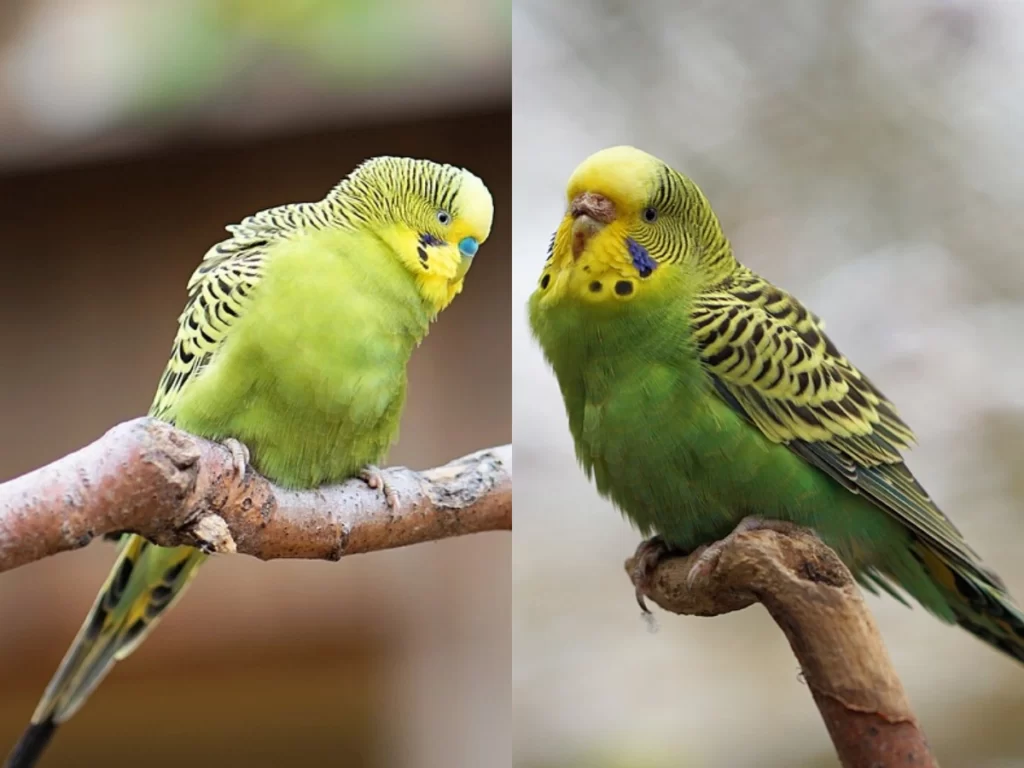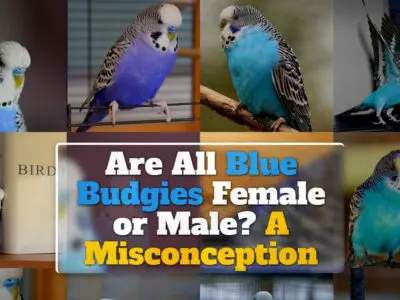Typically, male budgies tend to be more vocal than their female counterparts. They exhibit a wider range of sounds and songs, often used to attract mates.
On the other hand, female budgies usually vocalize simpler chirps and squawks.
Through my experiences and readings, I’ve decided to tackle the intriguing question: Are male or female budgies more vocal?
As a seasoned budgie owner and an animal lover, my insights and understandings might prove useful in your quest to comprehend these delightful creatures better.

Understanding Budgie Vocalizations
Budgies, have a remarkable array of vocalizations that can serve as a window into their complex world.
But to fully appreciate and interpret these sounds, we first need to understand the types and purposes of budgie vocalizations.
Budgie vocalizations can be broadly categorized into three types:
- Chirping: This is the most common type of budgie vocalization, and is usually a sign of contentment. Chirping can range from soft and melodic to loud and high-pitched.
- Chattering: Budgies chatter when they are feeling social and want to communicate. It can sound like a mix of whistling, singing, and talking.
- Squawking: Squawking is usually a sign that your budgie is upset, scared, or demanding attention. It’s louder and harsher than chirping or chattering.
Each of these vocalizations serves a distinct purpose, allowing budgies to express a wide range of emotions and needs.
For example, they may chirp happily while playing, chatter to interact with other birds or their human caretakers, or squawk to signal distress or demand attention.
Why Budgies Vocalize
Now that we’ve learned about the different types of budgie vocalizations, let’s delve deeper into understanding why these vibrant birds vocalize.
The reasons are surprisingly diverse and paint a rich picture of budgie social behavior.
Budgies vocalize for several reasons:
- Communication: Just like humans, budgies use vocalizations as a form of communication. This can be a way for them to interact with their fellow birds or bond with their human caretakers.
- Expression of Emotion: Budgies are emotional creatures and use vocalizations to express a variety of feelings such as happiness, fear, agitation, or curiosity.
- Claiming Territory: Male budgies often use vocalizations to assert their dominance and claim territory, especially in the presence of other male budgies.
- Attracting a Mate: Both male and female budgies use vocalizations as part of their courtship rituals to attract a mate.
- Health Indicator: Changes in a budgie’s vocalizations can sometimes be an indication of health issues. For instance, a budgie that is usually vocal but suddenly becomes quiet might be feeling unwell.
Understanding why budgies vocalize gives us a window into their social behavior, emotional state, and health, making it an essential aspect of responsible budgie care and observation.
Vocal Differences Between Male and Female Budgies
One of the fascinating aspects of budgies is the distinct vocal differences between males and females.
Although all budgies have a similar range of vocalizations, the frequency, intensity, and context of these vocalizations can differ significantly based on their sex.
Below, we’ll delve into these differences, helping you understand your feathered friends better and build a deeper bond with them.
Vocal Patterns in Male Budgies
Male budgies are generally known to be more vocal than their female counterparts. They have a repertoire of sounds and are more likely to engage in extended periods of singing and chattering.
Here’s what you should know about male budgie vocal patterns:
- Singing: Male budgies are known for their complex and melodious songs. These can be long sequences of various sounds, sometimes even mimicking human speech if they’ve been exposed to it.
- Chatter: Males often engage in continuous chatter, especially when they are happy or trying to attract a mate.
- Volume: Male budgies tend to be louder than females, especially when singing or asserting their dominance.
- Territorial Calls: Males often use specific vocalizations to assert their territory or dominance, especially around other males.
Vocal Patterns in Female Budgies
While generally quieter and less vocal than males, female budgies have their own unique set of vocal behaviors.
Here’s what to expect from female budgie vocal patterns:
- Chirping: Female budgies primarily engage in short, soft chirping, usually when they are content or happy.
- Chatter: While less frequent than males, female budgies can chatter, especially when interacting with their owners or other birds.
- Squawking: Female budgies tend to squawk more than males, usually when they are annoyed or want to assert their presence.
- Quieter Sounds: Overall, female budgies are usually quieter than males. Their vocalizations tend to be softer and less frequent.
By understanding the different vocal patterns of male and female budgies, you can gain a deeper appreciation of their behavior and communication style, enriching your relationship with these charming birds.
Vocal Changes in Budgies Over Different Times and Seasons
In addition to sex differences, budgies’ vocalizations also vary over different periods and seasons, which often correlates to their molting and breeding cycles, and age progression.
Recognizing these vocal variations can greatly aid in understanding your budgie’s needs and behaviors.
Budgie Vocalizations During Molting Season
The molting season, a time when budgies shed and regrow their feathers, can significantly affect their vocal behavior.
Here’s what you might notice:
- Decreased Vocalization: Molting is a stressful period for budgies, and during this time, they often become quieter and less vocally active.
- Changes in Tone: Some budgies may exhibit changes in their vocal tone, which can sound raspier or softer than usual.
- Restlessness: Budgies may vocalize restlessness through intermittent squawks and chirps due to the discomfort of growing new feathers.
Budgie Vocalizations During Breeding Season
The breeding season elicits distinct changes in budgie vocal patterns, particularly in males trying to attract mates:
- Increased Singing: Male budgies often increase their singing during the breeding season, aiming to attract a mate with their elaborate vocal repertoire.
- Aggressive Calls: Males might exhibit more aggressive or territorial calls to compete with other males for mating opportunities.
- Female Responses: Female budgies may respond to males’ advances with soft chirps, signaling receptivity.
Budgie Vocalizations as They Age
Like many other aspects of budgies’ behavior, vocal patterns also evolve as they age:
- Learning Phase: Young budgies go through a vocal learning phase where they often experiment with various sounds and tunes, mimicking their surroundings.
- Mature Patterns: As budgies mature, their vocalizations stabilize into predictable patterns. Males usually develop a more complex vocal repertoire, while females maintain simpler chirps and squawks.
- Old Age: In their later years, some budgies may become less vocal, often correlating to their overall activity levels.
Faqs
Can the Vocal Patterns of Budgies Help Determine Their Gender?
Yes, in many cases, the vocal patterns of budgies can help determine their gender. Typically, male budgies are known to be more vocal and exhibit a wider range of sounds and songs compared to females.
Their vocalization is often a part of their courtship behavior. Females, on the other hand, are known to vocalize simpler chirps and squawks.
Is There a Significant Difference in the Vocalization of Male and Female Budgies?
Yes, there is a significant difference in the vocalization of male and female budgies. Male budgies tend to be more vocal and their vocal repertoire is generally richer and more varied.
They often use a variety of sounds and songs, particularly as part of their mating rituals.
On the contrary, female budgies usually vocalize simpler, less varied sounds.
How Does Budgie Mating Ritual Influence Their Vocalization?
The mating ritual greatly influences the vocalization of budgies, especially in males. As part of their courtship behavior, male budgies are known to vocalize more and produce a broader array of sounds and songs to attract potential mates.
Female budgies are less vocal during these times, typically sticking to simpler, less varied vocalizations.


